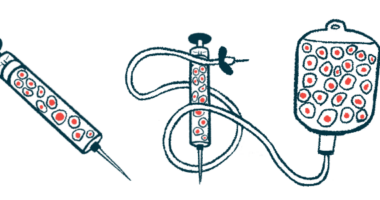Data Support Long-term Efficacy of Berotralstat in HAE, BioCryst Says

New clinical trial data show that BioCryst Pharmaceuticals‘ investigational therapy for hereditary angioedema (HAE), berotralstat, reduces the frequency of HAE attacks and improves patients’ quality of life through 48 weeks of treatment.
The data were presented at the European Academy of Allergy and Clinical Immunology Digital Congress.
HAE is characterized by the excessive production of the inflammatory molecule bradykinin, which causes blood vessels to widen and leads to swelling. Berotralstat is an oral medication that works by blocking the bradykinin precursor, called plasma kallikrein, which lowers bradykinin levels.
The new data come from two ongoing clinical trials assessing berotralstat in participants with HAE, APeX-2 (NCT03485911) and APeX-S (NCT03472040, still recruiting).
In APeX-2, 31 participants who were assigned randomly to receive 150 mg of berotralstat (taken daily by mouth) have completed 48 weeks (about a year) of treatment. Prior to the start of the trial, at baseline, these participants had an average HAE attack rate of 2.9 attacks per month. After one month of treatment, this rate decreased to 1.5 attacks per month, and after a year to 1.0 attack per month.
In APeX-S, 73 participants have completed 48 weeks of treatment at the same dose (150 mg per day). In six of the twelve months of the study, the median number of attacks per month was zero.
Also in APeX-S, quality of life was measured via the angioedema quality of life questionnaire (AE-QoL). In this scale, a decrease (indicating less severe symptoms) of six points is considered the minimum change that is clinically meaningful — that is, noticeable by the individual and his or her carers.
Such clinically meaningful improvements in AE-QoL were observed after four weeks of treatment and persisted up to 12 months; at 48 weeks, the average AE-QoL score had decreased by 14.7 points relative to the start of the trial.
An integrated analysis from both trials, which included data for 342 participants, showed that berotralstat was safe and generally well-tolerated. No new safety findings were reported.
The common cold was the most commonly reported adverse event (side effect), and it occurred with a similar frequency in participants given berotralstat and in those given a placebo. Gut-related adverse events led to berotralstat treatment discontinuation in 3.2% of participants.
Berotralstat-related serious adverse events were reported in three (0.9%) participants. These resolved after stopping or interrupting berotralstat treatment.
“As HAE patients continue in our long-term clinical trials, we are seeing reductions in attack rate and increases in QoL scores which highlight the impact oral, once-daily berotralstat could have in reducing the burden of disease for patients currently dependent on injectable or infused prophylaxis options,” William Sheridan, chief medical officer of BioCryst, said in a press release.
In other recent news, BioCryst announced it has established an expanded access program (EAP) for HAE patients in the U.S. Licensed physicians in the country now may request berotralstat for HAE patients who do not have access to the therapy through a clinical trial.






